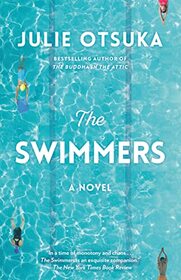Helpful Score: 1
Thanks to the From the Front Porch podcast for introducing this novel to me. Since then, I've seen The Swimmers by Julie Otsuka featured by several readers, but none prepared me for its triggers since I'm the daughter of a parent who recently moved to a skilled nursing facility.
This powerful novel is told with 'spare' prose in 175 pages via three interconnected short stories:
- the description of a diverse group of swimmers who frequent an underground pool
- the progression of events when cracks begin to form in the bottom of the pool
- the frank description of living in a memory care facility from the resident's point of view
The novel is shaped like a funnel, beginning with a group of vaguely defined characters and eventually focusing on Alice, an elderly Japanese American woman who has a rare form of dementia.
On a surface level, the pool cracks remove Alice from her deeply engrained routines which results in her being admitted to a for-profit memory care facility. On a metaphoric level, the cracks in the pool represent the progression of Alice's disease.
The third section, which is narrated by Alice's until-recently-estranged daughter, should be required reading for all staff who work in senior living communities.
This slim volume isn't for everyone, but I encourage readers who seek a unique writing style that explores an end-of-life mother-daughter relationship to check it out. I'm grateful to have read it.
This powerful novel is told with 'spare' prose in 175 pages via three interconnected short stories:
- the description of a diverse group of swimmers who frequent an underground pool
- the progression of events when cracks begin to form in the bottom of the pool
- the frank description of living in a memory care facility from the resident's point of view
The novel is shaped like a funnel, beginning with a group of vaguely defined characters and eventually focusing on Alice, an elderly Japanese American woman who has a rare form of dementia.
On a surface level, the pool cracks remove Alice from her deeply engrained routines which results in her being admitted to a for-profit memory care facility. On a metaphoric level, the cracks in the pool represent the progression of Alice's disease.
The third section, which is narrated by Alice's until-recently-estranged daughter, should be required reading for all staff who work in senior living communities.
This slim volume isn't for everyone, but I encourage readers who seek a unique writing style that explores an end-of-life mother-daughter relationship to check it out. I'm grateful to have read it.
Well, I loved the author's other books, and as a regular at the pool, I thought I'd love this book. Sadly, I thought it merely ok, actually tedious in parts. Quick read, though.




